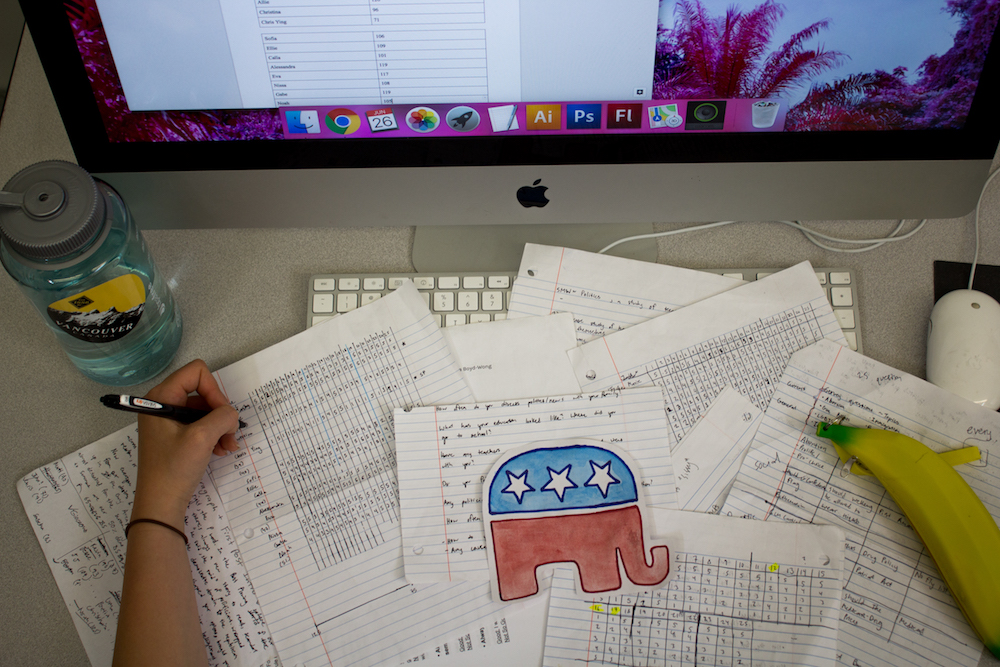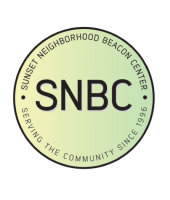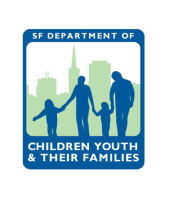So here we are, prepared for your political bubble to be popped, as this is the culminating and conservative climax to this column. While the overwhelming majority of the responses to the survey were largely liberal, the cluster of conservative contributors was far more compelling to me. The group evidently exceeded my expectation, I got far more conservative respondents than I had anticipated. So I set to find out whether this is an indication of political permutations amongst my peers, or just a conservative coincidence.
Once again, for privacy’s sake, every person participating have been given a mock monicker, a fake name. For each interview, whether the person was a downright Democrat or a radical Republican, they were asked a series of set standardized questions regarding their personal life, education, family, as well as political awareness, involvement, and perspectives.
For my final few discussions, I had the contentment of conversing with a couple of conservative 16- and 17-year-olds cultivated here in Bay Area. They each came from a mix of different cultural backgrounds, such as Shane(age 16) who is Armenian-American. Out of the three teenagers I interviewed, two of them (Ana and Myles, both age 17) are either Chinese or Chinese-American.
Ana: I was born in Taiwan, and left when I was just over a year old, so obviously I don’t remember anything about it, but my parents said that they had to answer so many questions, which was frustrating for them because most people don’t have to go through such a long process, they just have sex and have a baby. From my understanding of it was a long process.
It is well-known that people’s morals are often created by their church, so I prompted each on their religious relation. I found that one commonality between the trio was some form of Christianity.
Do you have any religious affiliations?
Myles: Not officially, but I would say that I am a Christian. It’s had a big impact, from kindergarten to eighth grade I went to a Christian school, and I’d say that really brought me into the faith, and ever since I’ve worn a cross around my neck. I don’t go to church very often. My parents do not like that I go. They don’t mind, but also because I haven’t found a church that I really like, some pastors are just idiots and stuff, I haven’t found one I really like yet.
While Myles went to a primary school with an emphasis on religion, this wasn’t the case for Ana and Shane. I did, however, found it intriguing that all three of them did attend private schools from kindergarten through eighth grade. Similarly to Myles, Shane recalled that while his primary school did not preach any political propaganda, it did put emphasis on Christian values.
How would you describe your early education? Were there any obvious political leanings?
Ana: …I went to a very preppy private all-girls school, that by eighth grade I wanted out of. It’s definitely shaped almost everything about me. Even though I’m now in high school, I’m definitely different from most students. When we were little, we were very focused on female empowerment, but it feels different than a lot of the Feminist pushes that are made in other places. For example, at my high school, the way the Feminist movement is expressed is different, as well as what we are shown in textbooks. I can’t exactly explain the way it feels different…
Regardless of religious schools or collegiate classrooms for your early education, your family can shape your political positions. I prompted each about personal lives, as well as their family’s political perspective. One of the strongest similarities was that all three agreed that they talk to their parents about politics quite regularly, although some seemed more specific than others.
What’s your family like? How often do you discuss politics? What are their views?
Ana: We watch the news together every day. We watch CNN and Fox, but never watch MSNBC, because it’s just so liberal. We watch them every day. As it’s going on, we will be talking and discussing. I try to read the paper with my dad in the morning… my family kinda has a small book club where we discuss, it’s really like politics, politics, politics, every day!
Myles: Personally, I am probably more conservative than both of my parents. It comes up pretty often, but only when I bring it up. I always prompt it. We talk about national and international, hardly ever local politics.
However, there is no one teenagers talk to more than their peers, no one they frequent democratic discussion with more than their friends. Each of the three agreed that politics came up quite often with their friends/peers. Specifically, Ana brought up a specific situation of discussing politics over social media.
Ana: Sometimes when I’m following someone on their private social media accounts, and they post saying something like, “This girl did this, and it’s cultural appropriation,” or, “This person did this, and it’s misogyny.” When I read the example stated, I just don’t agree. I feel like a lot of the time, certain people I know personally, all they want to talk, it’s almost like they hate anyone who questions what they think even if all the person is bringing up is lightly rethinking an idea.
As each of these adolescents are well aware of our current politics, I was apprehensive to see what news sources they followed, and all three had an array of answers.
Is there a news source or media outlet that you go to regularly?
Myles: I constantly read the news. So far this summer, the first thing I do when I wake up, I turn on NPR and I listen to some conservative talkers, liberal talkers. I follow NPR, CNN, but for me, recently they are a little too left-leaning. I also do The Daily Wire, which is conservative, The Ben Shapiro Show, which is conservative, Jordan Peterson, more of a moderate, Dave Rubin, who is a gay conservative, and I watch Steven Colbert, John Oliver, and I get news updates on my phone.
Shane: I read a lot of online articles, not as many in print. I watch Fox News, Brandon Tatum on YouTube, a few podcasts like The Daily Wire sometimes, and Dave Rubin. And of course, my family and I watch the news every night at 11, focusing primarily on local and national.
As they started to jump into above, each mentioned a few political people they follow frequently. Some of the biggest names mentioned were Ben Carson, Ben Shapiro, Dave Rubin, Steven Crowder, Trey Gowdy, and Mitt Romney.
Shane: I follow and agree with the President, for the most part. I follow Ben Carson, and Governor Kasich, during the primary races a few years ago. I’d say I listen to Ben Shapiro, Dave Rubin, and Brandon Tatum quite regularly. However, when it comes to Steven Crowder, I’m a bit mixed.
Myles: Ben Shapiro is my favorite political thinker and theorist, followed by Jordan Peterson. When he [Ben Shapiro] was 8 years old, he already had his own column, and I find that when he talks, he uses a lot of statistics and facts to back up his argument, but he also uses a lot of reasoning, and I generally agree with what he’s saying, because he makes his point very loudly and very clear. With Jordan Peterson, I’d say it’s the same thing.
Finally, I asked each How do you self-identify? While each personally identified as a conservative, there was some hesitancy from both Shane and Myles to label themselves conservative in the greater Bay Area public. Particularly something Shane brought up stuck with me.
Myles: If I’m in San Francisco, to be easy I would say conservative because if I would to go deeper into my views because San Francisco is so left-leaning, people often assume I’m further along the right than I am. If I was in a place that is more conservative, I would say I’m a moderate.
Shane: I would say moderate because I don’t feel safe saying that I’m a conservative in San Francisco. If I were in another place, I would say conservative, but not socially, mainly just politically.
Similarly, I was curious as to if there were any causes that called out to them, that they would volunteer for. Surprisingly, two of the causes that Ana and Myles identified were more politically liberal
Ana: If Trump hadn’t backtracked, I would have volunteered in favor of keeping families together. I think that whatever someone’s stance on immigration is, you shouldn’t be in favor of separating families, but I also believe that anyone entering the country should be entering legally. Also abortion, I think it’s probably an obvious problem, and pretty much solved, but I would be really pro-choice, so that’s an example of a way that I am extremely socially liberal… again, that issue is currently going backward, because of what Trump wants to do to Planned Parenthood.
Myles: Something that I’m actually campaigning for now is the equal rights amendment. Even though I identify with the right, I’m an ardent advocate for the belief that women should be treated the same as men. It’s not a surprise to me that due to the rise in conservatism in the ‘70s that this wasn’t passed, but it is surprising to me that ever since nothing has been passed.
As I did with each of my interviewees, for any question that they responded 100% yes or no to, I prompted as to why they answered the way they did. All three had a consensus on one of the few topics.
Do you support affirmative action?
Ana: I don’t really believe that cultural appropriation exists; it doesn’t strike the same chord for me as it does for other people. An alarm doesn’t go off if I see a girl wearing hoop earrings, I just feel like there are some things that people should just get over, and some things people have just created too much stigma around because people should just live and have a little fun. That was another one where I was hesitant about saying yes, I totally agree. I’m Asian, so Affirmative Action would not help me. There are other things against Asians, like I know I will be held to a higher standard to get into college, that’s what I’ve read, but I think that this one part of it is me being selfish, and knowing that it won’t help me, but I guess I agree that I think that it could encourage racism, because when there are white people who didn’t get into things because of Affirmative Action or something and think that it’s only because a minority or something was also applying.
Should the government increase environmental regulations to prevent climate change?
Shane: The US gets a lot of its product from China, gets its fuel and oil from Saudi Arabia, and those countries couldn’t care less about the environment. If the US puts more regulations on the internal system, it will only strain the United States. It’s been proven that companies who emphasize being environmentally-friendly go bankrupt, tons of big businesses collapse due to these cuts they make, and we continue to get all of our products from China and Saudi Arabia. When it comes to climate change, I believe there is nothing we can do.
A final topic that both, Shane and Myles had the same answer on was about women’s equality.
Do you support the current Feminist movement?
Myles: I think that when you are talking about the Feminist movement, you need to define what you mean. If you are talking about whether or not women should be treated equally, I already mentioned beforehand that they should be. That was first-wave Feminism, women having the right to vote, the right to be treated equally in the workplace, but when you are talking about second-wave Feminism and third-wave Feminism, it has turned into this man-hating movement where whenever it has anything to do with men, they are against it, and when you are talking about equality, hating men isn’t going to help you progress at all, even if you believe that women are still being opposed by men, the answer is not to hate men.
Shane: The word feminism doesn’t mean what it did 30 years ago, during the times of Roe v. Wade or trying to get birth control and planned parenthood… most people in the United States don’t identify themselves as feminists because of what journalists have portrayed it to be…over 90% of people believe in gender equality and equal rights but feminism currently is not the same thing, there’s a difference between being a gender equality activist and a feminist.
Overall, while this may be a liberal-looking location, the current generation of upcoming voters is far more varied when it comes to politics. I was fascinated to find the range of rarities as well as all the commonalities. The biggest dividing factor among this conservative crowd came out to be a support of pro-choice vs. pro-life views. While both of the boys took a pro-life stance, Ana, the young woman, took a pro-choice view. However, while this was one of the obvious varying answers, this also could have been due to the fact that she was the only female conservative I interviewed. Another key thing I noticed was that 2 out of the 3 were far more hesitant to share their political views openly in a public dialogue. I think regardless of views, openness and dialogue is one of the most important things we have and cannot be forgotten. I believe that while everyone should have an opinion that they feel proud to represent and talk about, we also need to have an environment in which people feel safe to express their views.
After sitting down with all these tremendous teenagers, from all the leftie liberals to the mid-ground moderates to all the cautious conservatives one thing that has never been clearer to me is to never stop talking! No matter the person or their views, conversation is the heart blood of politics regardless of confounding coincidences or particular personal lives, a dialogue is essential. So as my generation, this growing group of vivacious voters enters the polls, I hope that conversation is in the forefront of their decisions!





